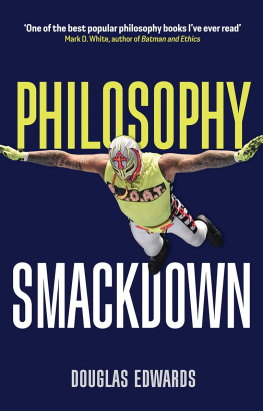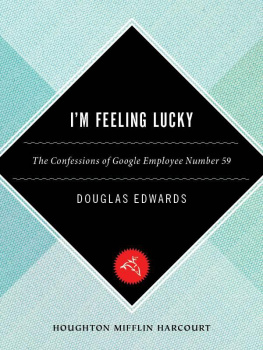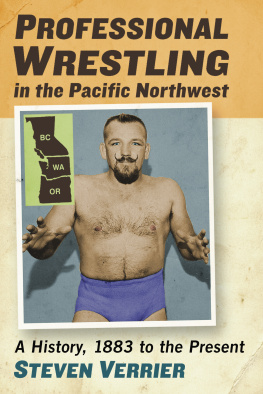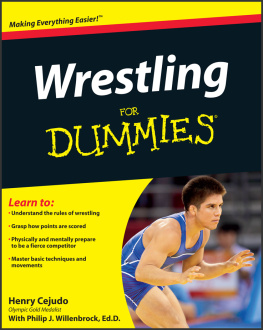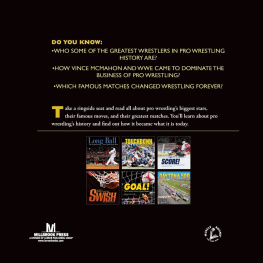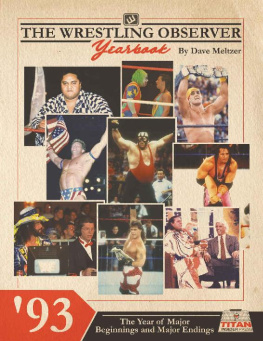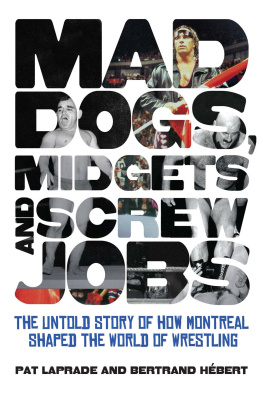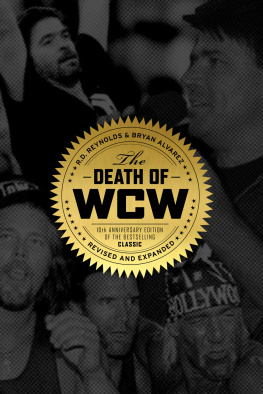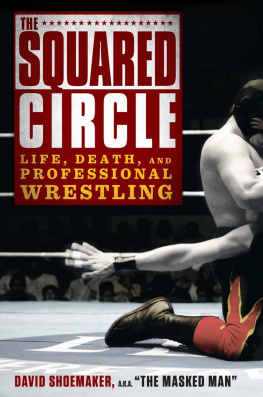
Dedication
To Theo and Lola
Philosophy Smackdown
Douglas Edwards
polity
Copyright Douglas Edwards 2020
The right of Douglas Edwards to be identified as Author of this Work has been asserted in accordance with the UK Copyright, Designs and Patents Act 1988.
First published in 2020 by Polity Press
Polity Press
65 Bridge Street
Cambridge CB2 1UR, UK
Polity Press
101 Station Landing
Suite 300
Medford, MA 02155, USA
All rights reserved. Except for the quotation of short passages for the purpose of criticism and review, no part of this publication may be reproduced, stored in a retrieval system or transmitted, in any form or by any means, electronic, mechanical, photocopying, recording or otherwise, without the prior permission of the publisher.
ISBN-13: 978-1-5095-3767-9
A catalogue record for this book is available from the British Library.
Library of Congress Cataloging-in-Publication Data
Names: Edwards, Douglas, 1958- author. | Polity Press.
Title: Philosophy smackdown / Douglas Edwards.
Description: Medford, Massachusetts : Polity, 2020. | Summary: Hulk Hogan and Socrates wrestle with the big ideas-- Provided by publisher. Identifiers: LCCN 2019038633 (print) | LCCN 2019038634 (ebook) | ISBN 9781509537655 (Hardback) | ISBN 9781509537662 (Paperback) | ISBN 9781509537679 (ePUB)
Subjects: LCSH: Wrestling. | Sports--Philosophy.
Classification: LCC GV1195 .E39 2020 (print) | LCC GV1195 (ebook) | DDC 796.812--dc23
LC record available at https://lccn.loc.gov/2019038633
LC ebook record available at https://lccn.loc.gov/2019038634
The publisher has used its best endeavours to ensure that the URLs for external websites referred to in this book are correct and active at the time of going to press. However, the publisher has no responsibility for the websites and can make no guarantee that a site will remain live or that the content is or will remain appropriate.
Every effort has been made to trace all copyright holders, but if any have been overlooked the publisher will be pleased to include any necessary credits in any subsequent reprint or edition.
For further information on Polity, visit our website: politybooks.com
Preshow
1. Origins
For me, it started with videotapes when I was about 10 or 11 years old. My younger brother Glyn would borrow them from his friend, and we would watch enraptured as these giant characters in colorful costumes grappled and slammed each other in the ring. Mostly World Wrestling Federation (WWF) WrestleManias, we watched Hogan beat Savage, Warrior beat Hogan, and then Warrior return to save Hogan. Growing up in the south of England, we had little idea where this was happening (apart from that it was in America), but we watched as much as we could. Action figures and posters followed I remember marveling at my friend Justins Legion of Doom poster, with Hawk and Animal snarling in their face paint and spiked football shoulder pads.
The moment when I really became gripped, though, was WrestleMania X, and the triumph of Bret Hitman Hart. Bret, at the time a classic babyface, or good guy, was a spirited, plucky hero in distinctive pink and black attire, who, despite not being the biggest guy in comparison to behemoths like Hulk and Warrior, relied on his technical expertise and skill to work his way to the top. At the time Bret was feuding with his brother Owen, and the story of their feud resonated with me. A classic story of sibling rivalry, it hit close to home: my brother and I constantly competed and strove to beat each other, no matter what we were doing. Only 18 months apart, we played pretty much any game you could think of, and the story was always the same. Me, trying to prove that, because I was older, I was better, and him trying to show that that was nonsense. Bret and Owens feud, pitched as it was with Bret the babyface and Owen the heel (bad guy) spoke to my 11-year-old self as a mirror of my experience: Bret even had brown hair, and Owen blonde hair, just like me and my brother!
After a shock loss to Owen in the opening match of WrestleMania X (which is also regarded as one of the best matches of all time), Bret overcame the odds to defeat the huge Yokozuna in the main event to become the WWF Champion. All the other good guys came out from the back to celebrate, lifting him up on their shoulders, as Owen looked on, scowling.
This cemented Brets status as my hero. And my brother, obviously, mocked me mercilessly for this whenever the opportunity arose. He would support whoever Bret faced. When I bought a Bret action figure, he bought a Ric Flair one. When we would wrestle at home, he would always assume the character of whoever Bret was facing at the time, while I valiantly tried to work out how to lock him in the Sharpshooter, Brets finishing submission hold. I think I only managed it once, but it was great. He got his revenge with a Pedigree on a block of wood.
As we progressed through our teens, we were lucky to get Sky TV at home, which meant we could watch WWF weekly shows and monthly pay per views. In 1997 a pivotal year for the WWF we watched Brets feud with Stone Cold Steve Austin, culminating in the spectacular submission match at WrestleMania 13. 1997 saw Bret become WWF Champion again, and progressed ominously towards his showdown with long-term nemesis Shawn Michaels at Survivor Series. After a long brawl, the match was reaching its culmination when Michaels put Hart in Harts own sharpshooter move. In a confusing sequence, the referee called for the bell, and Hart looked bewildered as Michaels went to the back celebrating. Haha, he submitted, crowed my brother, as I looked at the screen fading to black in disbelief no, he cant have done, hes Bret Hart! What just happened?
We didnt know it at the time, but we had just witnessed one of the most seismic and controversial moments in pro wrestling history, and one that would change the pro wrestling industry: the Montreal Screwjob. It was an event that would open the doors to the reality behind the wrestling business, and be of great interest to me later on, as a philosopher.
Soon after this, my brother lost interest in wrestling, and I started watching it with my friend Chris. We were watching during the legendary Attitude Era of the late 1990s/early 2000s, when Stone Cold Steve Austin and The Rock reigned supreme. We would stay up late into the night playing WWF No Mercy on the N64, and watch the monthly pay per views which, due to the time difference, ran from 1 a.m. to 4 a.m. on a Sunday night. Wed emerge bleary-eyed to school the next day, much to our parents dismay. We discovered the alternatives to the WWF. WCW had the New World Order, spectacular cruiserweights like Rey Mysterio Jr. and Eddie Guerrero, and the hilarious hijinks of Chris Jericho. In the early days of online video, wed find clips from the rebel outfit ECW of Rob Van Dam, Taz, Sabu, Rhino and the gang putting each other through tables, jumping off balconies, and kicking chairs into each others faces. What we couldnt watch, wed find out about through wrestling news websites, like Jimmy Vans knowyournews.com.
After Chris and I went our separate ways to university, the WWF subsumed these other companies, transformed into World Wrestling Entertainment (WWE), and I didnt watch much wrestling for a while. During this time, I discovered philosophy, which became something of an obsession of its own, and much of my time was devoted to it through undergraduate and graduate studies, and into my academic career, the early stages of which I spent in Ireland and Scotland. I would occasionally dabble in some wrestling-related stuff on the internet (particularly CM Punks pipebomb promo of 2011), but a lot of it passed me by. I did consider using the different ways you can win a wrestling match as an analogy for a view about truth I was developing, but ultimately decided against it.
Next page
